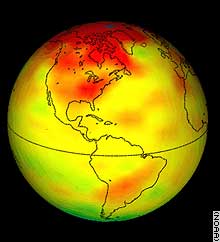It's not if, it's how bad: preparing for the climate crisis
Author Mark Hertsgaard begins his
article in the San Francisco Chronicle Sunday Insight:
"At the core of the global warming dilemma is a fact neither side of the debate likes to talk about: It is already too late to prevent global warming and the climate change it sets off. " Hertsgaard says that we have to shift from concentrating solely on preventing global heating to preparing for its effects.
His article puts in perspective the findings of the latest UN Panel on Climate Change, and more recent scientific realizations that the climate crisis has " already begun, and much sooner than expected. What's more, the problem is bound to get worse, perhaps a lot worse, before it gets better."
That's because this is the first systems crisis, challenging not only the ability of our political institutions to respond, but our maturity as a thinking species.
The climate crisis is a systems problem because the time lag between cause and effect. In systems theory this can cause a number of paradoxes, in combination with other factors. But the basic problem politically is that by the time the crisis is evident, it is too late to stop it. Or specifically, as Hertsgaard writes, there is a lag of from 50 to 100 years. Which means that the climate we have now is partly the result of what was poured into the air in the 1950s. Anything we do now to limit emissions may not appreciably change what will happen in the next 50 years or the rest of the 21st century.
This is also because that once global heating got started, it began essentially feeding on itself. This is where the concept of a tipping point is meaningful. Whenever it was, we have likely passed it.
The problem of understanding the dynamic was always central to the problem of focusing attention on the climate crisis. Apart from the greed and political advantage that kept this issue from assuming the priority it deserved, this lack of comprehension of time lag and complex systems behavior is why we didn't attack the climate crisis before it began.
(Ironically perhaps, and perhaps tragically, it is another time lag---between scientific and even quasi-scientific understanding of the basics of systems, and the general and political acceptance of that thinking---that may ultimately defeat us.)
So what do we do now? Hertsgaard says that concentrating exclusively on Kyoto and similar strategies is not enough, that we need to make plans to "defend ourselves" against the inevitable effects. But to do this in an effective and orderly manner requires what has been lacking: a general sense of crisis, and the political will to address it.
Why this is so and what can be done is a matter of increasing controversy among environmentalists and their organizations. One major contributor is the
broadside authored by Michael Shellenberger and Ted Nordhaus, which among other assertions, takes the environmental movement to task for splitting its focus and competing to support pet projects while allowing the climate crisis to grow without public awareness.
Carl Pope of the Sierra Club issued a spirited rejoinder, agreeing with some of their points and disputing others, notably in a message to funders, found
here:Shellenberger and Nordhaus scorn suggestions that part of the problem is nomenclature, that "global warming" sounds too soft and cuddly, and therefore people don't get so concerned about it. I first raised this issue myself several years ago, along with making other suggestions to bring this issue to a public boil,
here: And in a more recent essay in the SF Chronicle,
here:
While I agree that much time has been lost because environmentalists haven't prioritized the issue, and worked together through a single organization, the problem of public awareness and political will is much more complicated. I still believe that nomenclature plays a part in public awareness, which is essential to putting pressure on politicians. "Global heating" and "climate crisis" are much more accurate as well as motivating terms than "global warming" and "climate change."
Similarly, the role of celebrities in focusing attention remains part of the mix, and in this, we may have caught a break. Right now the foremost U.S. celebrity who has made this his priority issue is Leonardo DiCaprio, with a TV documentary he narrates (in Canada, Alanis Morrisette and Keanu Reeves narrate similar documentaries.) With his Oscar nominated role in "The Aviator," Di Caprio's profile-and level of respect---is increasing.
The worst blow to climate crisis planning was the worst blow to addressing many other crucial problems---the continuing presidency of George W. Bush. So public awareness becomes even more important absent leadership from Washington.
But now the problem becomes not simply one of awareness, but of managing understanding. Sooner or later, the public is going to become aware that all the weirdness in the weather and other effects are linked to the cause of global heating. But choosing the right responses in a timely manner will be just as important as continuing to work to keep things from getting as bad as they could get in the future.
The most proximate danger, and the one we can do something about, is the Bush administration's wholesale robbery of the national budget well into the future. Those resources are going to be needed to fight the effects of the climate crisis, as well as working to prevent further deterioration.
No one yet mentions fighting the climate crisis as a reason to oppose what Bush is doing to pile up massive debt, but in the end it may turn out to be the most important reason.
We must end these excesses by defeating attempts to make tax cuts for the wealthy permanent, by defeating costly changes to Social Security, repealing very costly and counter-productive changes to Medicare, and ending the costly and counter-productive policy in Iraq.
That's the bare minimum. Sir David King, the UK's top scientific advisor, says that the climate crisis is
"the biggest danger humanity has faced in 5,000 years of civilization."It could end that civilization, as well as life on earth as we know it. For us, it is the supreme test of our "big brains" (as Kurt Vonnegut calls them) and their evolutionary value. Are we smart enough to foresee the crisis and the probable effects, and moral enough to set aside petty advantages including political ones, to do what must be done for the future.
Or will the world be plunged into chaotic crisis after crisis, from "natural" disasters to water wars, our hearts and minds armed with nothing but ignorance and fear?







